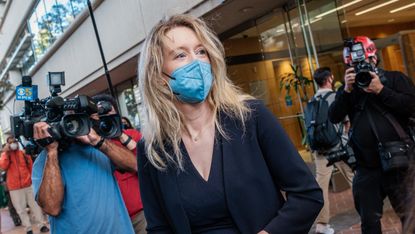Podcasts of the week: food, the Theranos trial, and 9/11
Featuring Kitchens, The Dropout, and 9/12

Podcasts about food bring obvious challenges, said Fiona Sturges in the FT. “If you can’t see it, or indeed smell or taste it, is there any point?” The answer is a resounding yes – as is amply demonstrated by Lucy Dearlove’s excellent podcast Lecker (the German for “delicious”) which has been exploring all aspects of food and the way we eat since 2016. Kitchens, her new mini-series under the Lecker banner, explores how the design and make-up of kitchens affect our diets, our social lives, and our quality of life. Her “masterstroke” is to interview not just experts but “everyday people who talk eloquently and revealingly about their relationships with their kitchens and the impact of kitchens on their relationships”. It sounds “niche”, but the series’ themes are “universal” – age, class and wealth loom large – and it has “profound things to say about the way we live”. Listen, and you “won’t look at your kitchen the same way again”.
Elizabeth Holmes is the Stanford University dropout who founded the US medical technology firm Theranos, and claimed to have revolutionised medicine with a radically new blood-testing process. Enough people believed her to send the value of the firm soaring to $10bn. But it all came crashing down, said Hannah J. Davies in The Guardian, and now she is on trial for fraud. The roller-coaster story of Holmes, Theranos, and her business partner (and ex-boyfriend) Ramesh “Sunny” Balwani, is told in The Dropout, an “acclaimed” ABC News podcast which is currently being made into a TV series starring Amanda Seyfried. It’s a “gripping” listen – and as the trial progresses, you can keep up with its developments via new episodes released each Tuesday.
Several new TV documentaries were released earlier this month, to mark the twentieth anniversary of the 9/11 terror attacks. Dan Taberski’s superb new Wondery podcast, 9/12, is not about that terrifying day, nor is it about the political fallout from it. Instead, it explores the “ripple effect of 9/11 on US culture”, said Miranda Sawyer in The Observer. “How it changed the way Americans approached their lives. Their reaction. The societal aftermath.” Taberski is a prolific and inventive podcaster – his previous productions include Missing Richard Simmons, Surviving Y2K and The Line – and a “warm, shrewd” interviewer. The mood is respectful, but not solemn, as he discusses, for instance, how the satirical magazine The Onion covered 9/11 in its issue days later (sample headline: “Hugging Up 76,000 Percent”); the evolution of conspiracy theories; and a CIA wheeze in which Hollywood screenwriters and directors were asked to help forecast what the bad guys might do next.
Subscribe to The Week
Escape your echo chamber. Get the facts behind the news, plus analysis from multiple perspectives.

Sign up for The Week's Free Newsletters
From our morning news briefing to a weekly Good News Newsletter, get the best of The Week delivered directly to your inbox.
From our morning news briefing to a weekly Good News Newsletter, get the best of The Week delivered directly to your inbox.
Create an account with the same email registered to your subscription to unlock access.
Sign up for Today's Best Articles in your inbox
A free daily email with the biggest news stories of the day – and the best features from TheWeek.com
-
 What is cloud seeding and did it cause Dubai's severe rainfall?
What is cloud seeding and did it cause Dubai's severe rainfall?The Explainer The future is flooded
By Devika Rao, The Week US Published
-
 American Airlines pilots are warning of a 'significant spike' in safety issues
American Airlines pilots are warning of a 'significant spike' in safety issuesIn the Spotlight The pilot's union listed 'problematic trends' they say are affecting the airline's fleet
By Justin Klawans, The Week US Published
-
 6 star-spangled presidential libraries to visit
6 star-spangled presidential libraries to visitThe Week Recommends These institutions provide insight into American leaders
By Catherine Garcia, The Week US Published
-
 5 podcasts you may have missed this winter
5 podcasts you may have missed this winterThe week recommends Take a chance on some of these shows before spring gets here
By Theara Coleman, The Week US Published
-
 5 podcasts you may have missed this fall
5 podcasts you may have missed this fallThe Week Recommends These shows are worth a binge before you start anticipating next year's podcast crop
By Theara Coleman, The Week US Published
-
 The Week’s best podcasts of 2022
The Week’s best podcasts of 2022The Week Recommends Top picks include 28ish Days Later, Can I tell you a secret? and the highly ‘bingeable’ Case 63
By The Week Staff Published
-
 Four of the best podcasts about women and society
Four of the best podcasts about women and societyThe Week Recommends Featuring Visible Women, Clipped Wings, Ki & Di: The Podcast and 28ish Days Later
By The Week Staff Published
-
 Podcasts of the week: from true crime to a true-crime drama
Podcasts of the week: from true crime to a true-crime dramaThe Week Recommends Featuring Killer Book Club, RedHanded, Criminal, Radioman and Lady Killers With Lucy Worsley
By The Week Staff Published
-
 Podcasts of the week: war reporters, hard news and big interviews
Podcasts of the week: war reporters, hard news and big interviewsThe Week Recommends Featuring The Line of Fire, The Ezra Klein Show and The Backstory with Andrew Neil
By The Week Staff Published
-
 Podcasts of the week: from French and Saunders to Vladimir Putin
Podcasts of the week: from French and Saunders to Vladimir PutinThe Week Recommends Featuring Whatever Happened to Baby Jane Austen?, Comfort Blanket and Taking on Putin
By The Week Staff Last updated
-
 Podcasts of the week: cult scams, cronyism and bingeable true-crime
Podcasts of the week: cult scams, cronyism and bingeable true-crimeThe Week Recommends Featuring Twin Flames, Our Friends in the North and Chameleon: Wild Boys
By The Week Staff Last updated